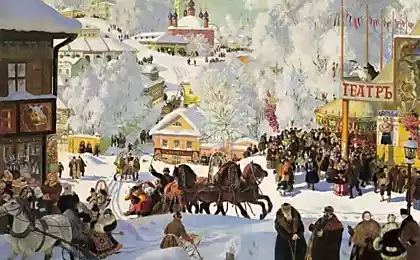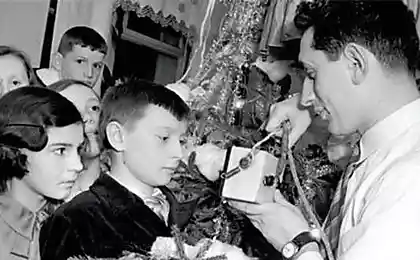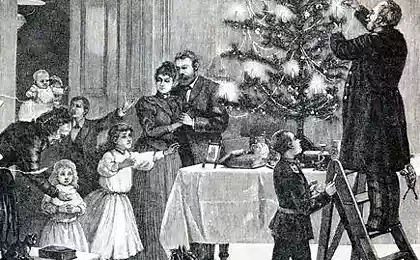741
Old New Year (9 photos)
95 years ago, on January 14, 1919, in Russia first began to celebrate Old New Year.
In pagan times New Year was celebrated in Russia March 22 - the day of the vernal equinox, and this was associated with the agricultural cycle. With the adoption of Christianity in the Byzantine calendar had begun to displace the old, and already the new year begins on 1 September. For a long time still remained inconsistency, and in some places continued to celebrate the New Year in the spring. Only in the late 15th century in Russia is officially defined the beginning of the New Year - on 1 September. On January 1, New Year was moved only in 1699 by decree of Peter I.
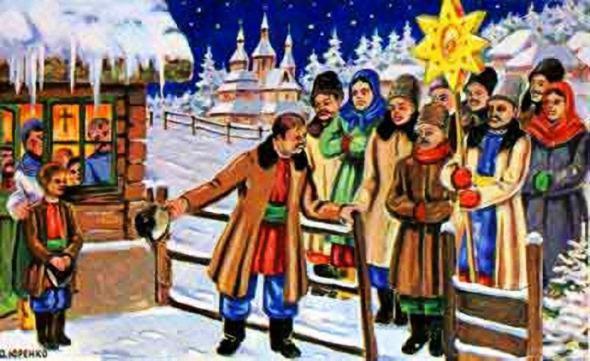
24 January 1918 by the Council of People's Commissars approved the "Decree on the introduction of the Russian republic of West-European calendar," which is February 1, 1918 came into force. Thus, the calendar shifted to 14 days.
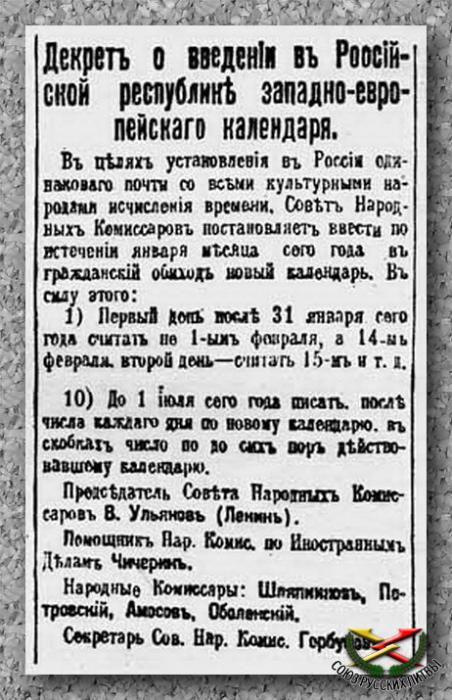
European countries have long lived in the Gregorian calendar, named after Pope Gregory XIII, and Russia - Julian (on behalf of Julius Caesar).

Since January 1 the new style was the 14th number of the new. The custom is to meet Old New Year on the night of 13 to 14 of January in Russia due to the fact that the Russian Orthodox Church continues to meet and New Year and Christmas according to the Julian calendar, differing from the common Gregorian. So, the Russians (and not only them) have every right to mention everyone's favorite holiday once more!
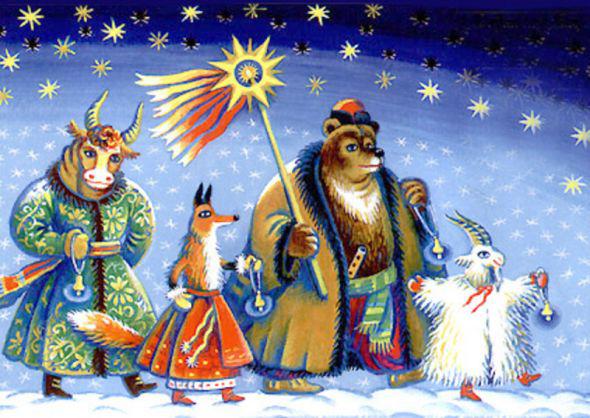
Interestingly, the day before the New Year, which in ancient times was called Vassiliev day in Russia had crucial for the whole year. Vasile celebrated the feast day of farming, which is associated with the future harvest, and perform the rite obsevaniya - hence the name of the holiday "Ovsenev" or "Avsenev." This ceremony was different in different regions of the country: for example, in Tula children scattered around the house spring wheat, while saying a prayer for rich harvest, and the woman then collected it and kept until the time of sowing. Ukrainian ceremonies differed fun, dancing and singing.
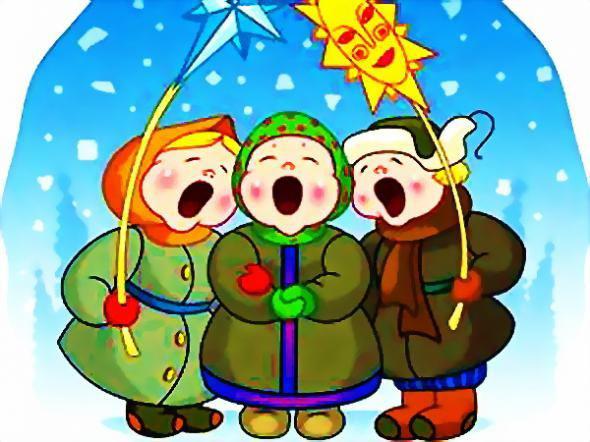
And another was a kind of ritual - cooking porridge. On New Year's night, at 2 o'clock, the eldest of the women brought the rump of the barn, and the senior man brings water from a well or river. To touch the rump and water as long as the oven does not heat up, it was impossible - they simply stood on the table. Then all sat down at the table, and the eldest of the women began to stir the porridge in the pot, saying at the same time certain ritual words - cereal was usually buckwheat. Then they all got up from the table, and the hostess put porridge in oven - with a bow. Cooked porridge fetched from the oven and carefully considered. If the pot was just a complete mess and - the richness and crumbly, it was possible to wait for a happy year and a rich harvest - a morning porridge eaten. If you get out of the porridge pot or pot cracked - it did not promise anything good owners of the house, and then expect trouble and threw porridge.
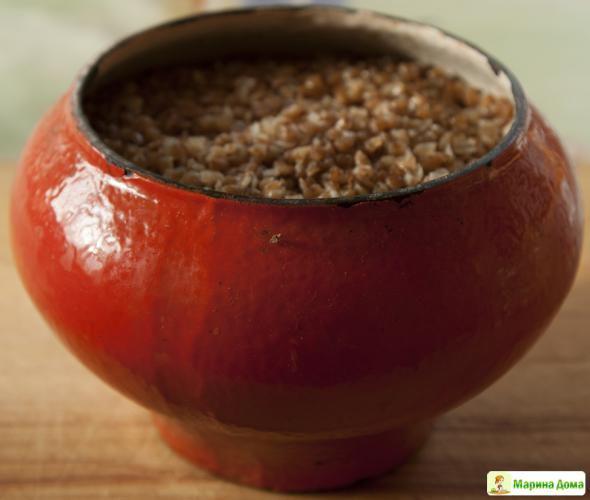
They deserve special attention as a girl's fortune-telling. That just did not do the representatives of the weak half, only to learn that they are ready to capricious fate.
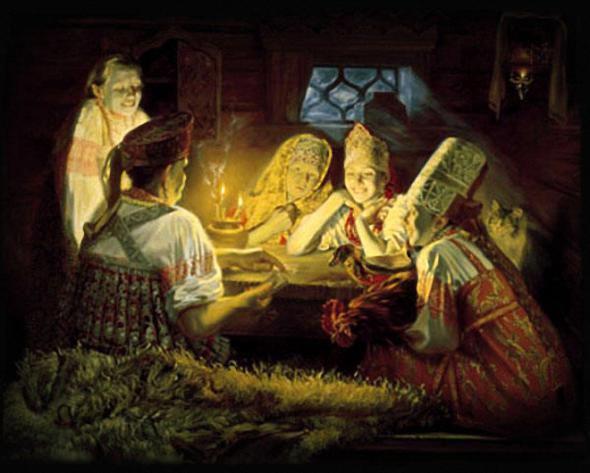
Another interesting ritual of going from house to house, treat yourself to dishes from pork. Night Basil visitors certainly had to feed the pork pie, boiled or roasted pork feet and in general any dishes which include pork. The board is also required to put a pig's head. The fact that St. Basil believed "svinyatnikom" - the patron saint of pig farmers and pork products, and believed that if the night on the table will be a lot of pork, then these animals will breed in the economy in abundance, and bring the owners a good profit. Here is a sign of a much more positive rite of porridge, especially zealous and hardworking owners.
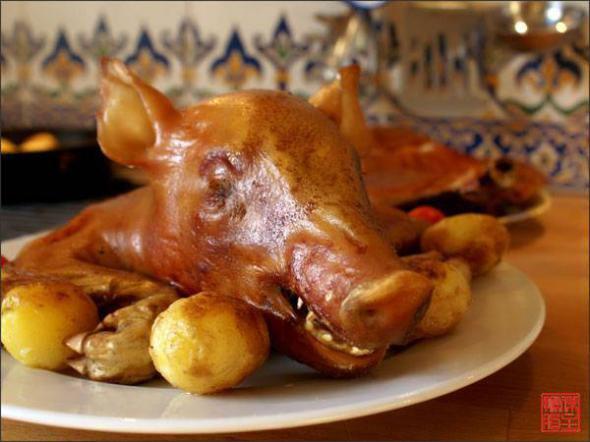
Surprisingly sonorous and foldable saying "yes piggy Borovka for Vasilyeva Vechercom" also contributed to the mood of the hosts in the economic prosperity and abundance. But the tradition of mold on Old New Year dumplings with surprises appeared not so long ago - no one really can not remember where or when, but it pleased observed in many regions of Russia.

In some cities, they mold in almost every home - with family and friends, and then arrange a fun meal and eat these dumplings, looking forward, to whom and what will fall surprise.
In pagan times New Year was celebrated in Russia March 22 - the day of the vernal equinox, and this was associated with the agricultural cycle. With the adoption of Christianity in the Byzantine calendar had begun to displace the old, and already the new year begins on 1 September. For a long time still remained inconsistency, and in some places continued to celebrate the New Year in the spring. Only in the late 15th century in Russia is officially defined the beginning of the New Year - on 1 September. On January 1, New Year was moved only in 1699 by decree of Peter I.

24 January 1918 by the Council of People's Commissars approved the "Decree on the introduction of the Russian republic of West-European calendar," which is February 1, 1918 came into force. Thus, the calendar shifted to 14 days.

European countries have long lived in the Gregorian calendar, named after Pope Gregory XIII, and Russia - Julian (on behalf of Julius Caesar).

Since January 1 the new style was the 14th number of the new. The custom is to meet Old New Year on the night of 13 to 14 of January in Russia due to the fact that the Russian Orthodox Church continues to meet and New Year and Christmas according to the Julian calendar, differing from the common Gregorian. So, the Russians (and not only them) have every right to mention everyone's favorite holiday once more!

Interestingly, the day before the New Year, which in ancient times was called Vassiliev day in Russia had crucial for the whole year. Vasile celebrated the feast day of farming, which is associated with the future harvest, and perform the rite obsevaniya - hence the name of the holiday "Ovsenev" or "Avsenev." This ceremony was different in different regions of the country: for example, in Tula children scattered around the house spring wheat, while saying a prayer for rich harvest, and the woman then collected it and kept until the time of sowing. Ukrainian ceremonies differed fun, dancing and singing.

And another was a kind of ritual - cooking porridge. On New Year's night, at 2 o'clock, the eldest of the women brought the rump of the barn, and the senior man brings water from a well or river. To touch the rump and water as long as the oven does not heat up, it was impossible - they simply stood on the table. Then all sat down at the table, and the eldest of the women began to stir the porridge in the pot, saying at the same time certain ritual words - cereal was usually buckwheat. Then they all got up from the table, and the hostess put porridge in oven - with a bow. Cooked porridge fetched from the oven and carefully considered. If the pot was just a complete mess and - the richness and crumbly, it was possible to wait for a happy year and a rich harvest - a morning porridge eaten. If you get out of the porridge pot or pot cracked - it did not promise anything good owners of the house, and then expect trouble and threw porridge.

They deserve special attention as a girl's fortune-telling. That just did not do the representatives of the weak half, only to learn that they are ready to capricious fate.

Another interesting ritual of going from house to house, treat yourself to dishes from pork. Night Basil visitors certainly had to feed the pork pie, boiled or roasted pork feet and in general any dishes which include pork. The board is also required to put a pig's head. The fact that St. Basil believed "svinyatnikom" - the patron saint of pig farmers and pork products, and believed that if the night on the table will be a lot of pork, then these animals will breed in the economy in abundance, and bring the owners a good profit. Here is a sign of a much more positive rite of porridge, especially zealous and hardworking owners.

Surprisingly sonorous and foldable saying "yes piggy Borovka for Vasilyeva Vechercom" also contributed to the mood of the hosts in the economic prosperity and abundance. But the tradition of mold on Old New Year dumplings with surprises appeared not so long ago - no one really can not remember where or when, but it pleased observed in many regions of Russia.

In some cities, they mold in almost every home - with family and friends, and then arrange a fun meal and eat these dumplings, looking forward, to whom and what will fall surprise.
